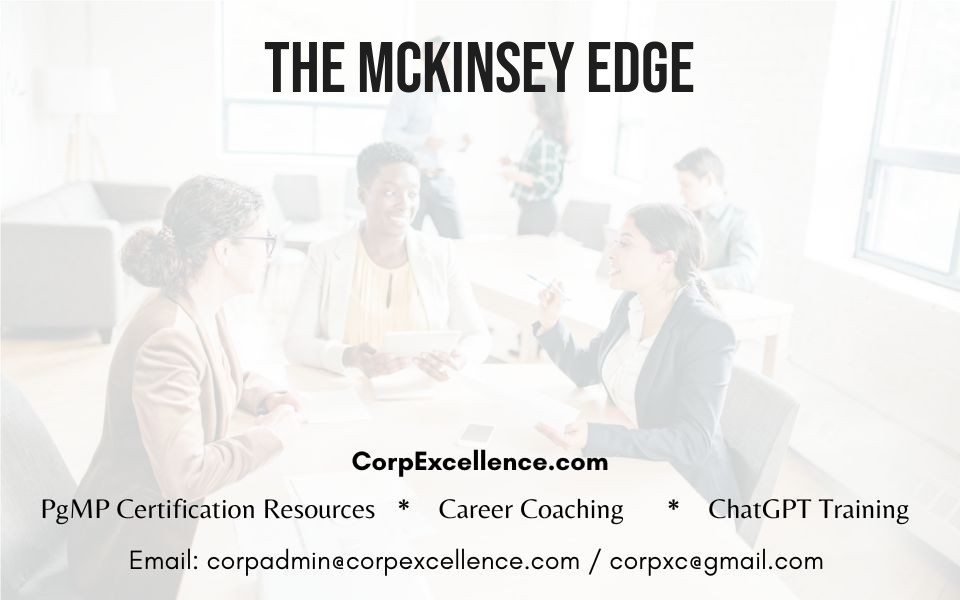This episode provides a book review of the book “The McKinsey Edge: Success Principles from the World’s Most Powerful Consulting Firm”. This book is authored by Shu Hattori who was a consultant at McKinsey. In less than 200 pages, the book provides 47 principles from the area of consulting gleaned from the experiences of current and former McKinsey consultants.
Podcast Transcription
In this episode, we will review the book called “The McKinsey Edge: Success Principles from the World’s Most Powerful Consulting Firm”. This book presents best practices from the consulting industry and draws upon the experience and observations of numerous Mckinsey executives and consultants. The book is authored by Shu Hattori who was an ex-engagement manager at McKinsey.
If you are a consultant or thinking of making a career in consulting, this book can provide you with numerous tips from the field of business consulting. The book presents 47 day to day strategies or principles as it calls them that are essential to become a successful consultant. These principles are covered in four chapters of the book. This book is an interesting read because it provides various insights from one of the most well-known and respected consulting organizations of the world. McKinsey is a global management consulting firm that works with various types and sizes of businesses across all industries. As the firm is well respected, any insights of its consultants obviously is always welcome. As I just mentioned, the book provides 47 strategies and principles gleaned from the experience of present and ex-McKinsey consultants.
The book is divides into 5 chapters. The 47 principles and strategies and their explanations are provided in the first four chapters.
Chapter 1 is called “Building the Better Self” and as the name implies it is about growing oneself. It covers principles related to knowing what to focus on in your engagements as a consultant, strategies needed for responding to business problems, and in general to handle various consulting situations. Some of the principles and strategies covered here include:
- Have a 30-Second Answer to Everything
- Go Beyond Your Self-Perceived Limit
- Find Your Role Models
- Create a Commitment Plan
- Catch Small Signals and Make a Difference
- etc
Chapter 2 is called “Growing with others” – This chapter is about consultants’ interactions with people and provides advice related to providing feedback, criticisms, managing employees, etc. This chapter covers a total of 17 principles of the total of 47 that are covered in the book. Some of the principles and strategies covered in this chapter include:
- Communicate Using Fewer Words
- Turn No into Yes
- Don’t Show Half-Baked Output
- Instantly Find a Connection in the Room
- Create Followership Through Deliberate On-the-Job Coaching
- etc
Chapter 3 is more about process management and how to excel in process management. Some of the principles and strategies covered here include:
- Focusing on Outcomes Not Activities
- Creating “Four Boxes” To Dos
- Preparing an Agenda Before Meetings
- Etc
CHAPTER FOUR is called “Going the Extra Mile” and covers strategies related to lasting growth. Some of the principles and strategies covered here include:
- Prepare to Renew Your Life
- Learn to Write Fewer Notes
- Create Your Own “Profile” as a Leader
- etc
Now a bit more on my views about the book. Here are some pros first.
As the book focuses on tips and principles related to becoming a world class consultant, you can use this book as a self-improvement guide. The book focuses on various aspects of communication skills, influencing teams and clients, managerial effectiveness and various leadership qualities that can help aspiring consultants to revitalize their careers.
Also, even if you are a seasoned consultant, I believe reviewing these principles can brush up a number of concepts and refresh your mindset related to how to deal with business problems and client situations.
In terms of cons and criticisms, although the book covers 47 strategies and tips related to consulting in one nicely compiled book, most of these principles are not particularly new and most consultants may know of them already. As these 47 principles are covered in a book of fewer than 200 pages, you may need to buy other books if you would like to delve deeper into each of those principles and strategies.
Also, if you are looking for a book that gets into the details of problem-solving then this is not the one that covers those concepts. This book instead focuses more on successful consultants’ traits and practices rather than on the actual techniques of problem-solving. It goes without saying then that the book does not get deeply into any case studies.
The book also does not provide you a lot of information about how McKinsey works – just tips and techniques from its current and former consultants on being a successful business consultant.
As for the writing style, I found the writing to be acceptable but not particularly superb.
Overall, this book can be helpful and will provide you some insights into the inner workings of McKinsey.
PgMP Certification Courses Training
Related Posts
Podcast: Play in new window | Download
Subscribe: RSS

